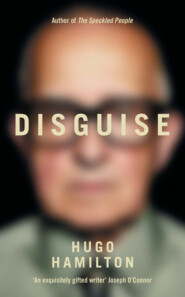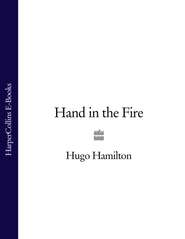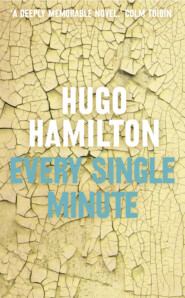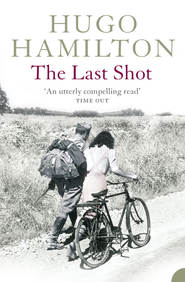По всем вопросам обращайтесь на: info@litportal.ru
(©) 2003-2024.
✖
The Speckled People
Настройки чтения
Размер шрифта
Высота строк
Поля
‘To my children,’ she writes. ‘One day, when you’re old enough, you will understand what happened to me, how I got trapped in Germany and couldn’t help myself. I want to tell you about the time when I was afraid, when I stood in my room and couldn’t shout for help and heard the footsteps of a man named Stiegler coming up the stairs.’
Nine (#ulink_4f2419ef-c3cb-511f-a237-f8cb5940b5e2)
On the first day of school I slapped the teacher in the face. I knew there would be lots of trouble. I thought Onkel Ted would have to come and make the sign of the cross over me, but when my mother came to collect me she said nothing, just smiled. The teacher said she had never been hit by a child before and that I was the boldest boy she had ever met in her entire life. My mother was so proud of me that she smiled and kneeled down to look into my eyes for a long time. Outside she told all the other mothers that I slapped the teacher in the face and they shook their heads. On the way home the bus conductor threw his eyes up and said I would go far. She even told the man with one arm in the vegetable shop.
‘You’ll have trouble with him,’ they all said, but my mother shook her head.
‘Oh no,’ she said. ‘He’s going to be like his uncle, Onkel Gerd.’
The teacher’s name is Bean Uí Chadhain and the school is called Scoil Lorcáin. You go down the steps into the classroom at the bottom and there is lots of noise from all the other children and a sweet smell, like a school bag with a banana sandwich left inside. There are toys in boxes to play with, but some of them are broken and the cars have bits of plasticine stuck to the wheels. There’s a map of the world on the wall and you learn to sing and go to the toilet in Irish, to the leithreas. And after that you get into another line to go to the yard, where the older girls are chasing and screaming, and across the wall the older boys are chasing and fighting. Then it’s time to sing the song about the little red fox. Everybody who is good gets a milseán, a sweet, and anyone who is bold has to stand on the table to show how bold you are.
‘Maidirín a rua, ’tá dána,’ we all sing together. The little red fox is bold. Except that bold doesn’t just mean bold, it also means cute and cheeky and brave and not afraid of people. The little red fox who is not afraid of anyone at all, we sing. But then Bean Uí Chadhain lifted me up on the table and said I was not going to get a sweet.
‘Bold, bold, bold,’ she said. ‘Dána, dána, dána.’
So then I slapped her in the face and my mother was proud of me. She’s so happy that she puts her hand on my shoulder and tells everybody in Ireland what I did. They shake their heads but they should be nodding. Only Onkel Ted nods his head slowly on Sunday when he comes, but then you don’t know sometimes what’s right and wrong because he nods slowly even when you tell him bad things that happened. He says there are some things you can only do once in your life and most people never do at all. My father says Bean Uí Chadhain is the wife of a famous Irish writer called Máirtín Ó Cadhain who wrote a book about dead people talking. It’s about a graveyard in Connemara where all the dead people talk to each other and anyone who dies brings new stories from the living world over the ground. I slapped the writer’s wife, my father says, and he’s proud, too, because the book was written in Irish. And dead people have the best conversations of all. Lots of people don’t really speak until they’re dead, because only then can they say all of the things to each other in the graveyard that they have been keeping secret all their lives.
My mother says you can’t be afraid of anyone. You can’t let anyone make you small, because that’s what they tried to do with Onkel Gerd. He had to keep quiet and say nothing while he was alive, but now he’s talking in the grave. He’s talking to my mother’s father and mother in Kempen, telling them that my mother didn’t go to Brazil after all, but went to live in Ireland instead. Now they’re having a great talk about how things were in the old days, all the jokes that Franz Kaiser made and why nobody had a sense of humour any more except for the people who were already in the grave and had nothing to lose. Now Franz Kaiser is playing all the tricks he didn’t get to finish before he died. And now Onkel Gerd is telling everybody down there that Hitler is dead. There were stories brought down with the war, when the planes were all going back home to England and they dropped the bombs on the bakery in Kempen very early one morning when everybody was queuing up for bread. There were stories going down of people killed all over Europe when nobody was able to stop the fist people from taking over.
My mother says you can’t, keep people from talking in the grave. And you can’t keep them quiet by making them stay at home or locking them up or stopping them from writing in newspapers. That’s why you should never be afraid to speak. My father says that all the people who died in the Irish famine are still talking. They’re whispering with dry lips and staring out with empty eyes. He says you can’t go anywhere in Ireland without hearing them. You go out into the fields around west Cork, he says, and it’s never silent, not even for a moment. He says a lot of the people born after the famine could not talk because they had lost their language and that’s why they speak English and have to listen to the words first before they can be sure of what they’re saying. But all that will be put right now that we’re speaking Irish again.
You’re better off dead than not being able to speak, my mother says. That’s what they tried to do to Onkel Gerd. He was the Bürgermeister, the lord mayor, and they came to him every day and asked him to do things he didn’t want. Ta Maria was the sister of my mother’s mother Berta and she was called Frau Bürgermeister, Mrs Lord Mayor. Then they suddenly had five daughters to look after and send to school every day on the train to the convent in Mühlhausen. So when people came to the house and said the lord mayor should belong to the Nazi party, he said he was the father of five girls and shook his head every time. They were friendly and polite and spoke to Ta Maria, too, on the way across the Buttermarkt square, hoping that she would change his mind. They liked Onkel Gerd and said he was a good lord mayor, so they didn’t want him to be made small like the other man Lamprecht who had to be taken away to a camp in Dachau because he kept on writing in the newspaper. They said they were hoping that would not happen to a man with five lovely new daughters.
Onkel Gerd sat in silence for a long time every evening, my mother says, because it was not easy to know what was right and wrong sometimes. My mother and her sisters kept on going to school and every Sunday they went to the graveyard to visit their father and mother. They passed by the old house on the Buttermarkt square but never went inside again because there were other people living there now. The town had changed. Everyone was poor and it was all right to beg and have a leg missing. People who had never dreamed of asking for things before were coming up to the house looking for help. So then there was an election and the Nazi party promised there would be no beggars in Germany ever again. At night, people said there were groups of men gathering around fires outside the town. People didn’t know whether it was exciting or frightening or both, because on the day of the election the town was full of cars and people drinking beer in their best clothes, and when Onkel Gerd went up to vote, there was trouble.
My mother says they were very sly. They wanted to see what side Onkel Gerd was on, so they gave him a ballot paper with a special mark on it. He looked at the names of the parties and the boxes beside them to make an X in, with the Nazi party at the top and all the other parties like the SPD and the Central party below. When he held the ballot paper up to the light he found a small watermark in the corner that should not have been there. He knew they could check afterwards to see where he put the X.
Вы ознакомились с фрагментом книги.
Приобретайте полный текст книги у нашего партнера:
Приобретайте полный текст книги у нашего партнера:











